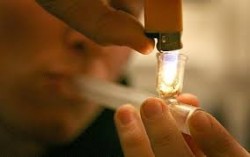Crack Cocaine Withdrawal

Crack cocaine withdrawal symptoms can be very serious, if not treated properly.
Crack is a drug that is a combined form of cocaine that has been heated with other substances such as baking soda or similar substances to create a hard form. Crack is also called freebase and is considered more addictive than powder cocaine. Because crack is most often smoked, it creates an almost immediate euphoric sensation that quickly dissipates and causes the user to crave more. Crack cocaine withdrawal begins to take place within mere minutes after smoking the substance and can create an almost immediate addiction to the drug for some users.
The effects of smoking crack cocaine include:
- paranoia
- psychosis
- increased cravings for crack
- increased alertness
- insomnia and difficulty sleeping
- increased energy
- heightened euphoric state
- loss of appetite
Unfortunately, smoking crack cocaine causes near immediate changes in the chemical structure of the brain and these changes do not quickly return to normal. Crack cocaine withdrawal begins just minutes after crack is smoked and for the user can quickly develop into an uncontrollable urge to find and smoke more of the drug.
Short Lived Effects
For a user who smokes crack cocaine, the effects of the drug are short lived and the effects of withdrawal are quick to set in. Withdrawal symptoms can persist for many weeks, months or even years for the addict who has smoked the drug for quite some time. Withdrawal symptoms that appear when crack is no longer being used include:
- anxiety and paranoia
- crawling skin
- seizures
- respiratory problems
- cardiac arrhythmia
- tremors and shakes
- hallucinations
- depression
Crack cocaine withdrawal is very difficult to cope with due mostly to the psychological elements of the withdrawal. The user will quickly become so preoccupied with finding more crack, smoking more crack and chasing the next high that addiction is eminent. When crack is no longer present, the user will have extreme psychological cravings for the drug and these cravings are typically the most difficult to control withdrawal symptoms.
Many people who are going through crack cocaine withdrawal do not have a will to live without the drug. In fact, crack withdrawal can make a user feel as if there is no reason to live life unless drugs are involved. Addicts must learn how to deal with everyday issues and learn how to control cravings without giving in to their addiction to crack cocaine—and this process can be very challenging.
Treatment for Crack Cocaine Withdrawal
If you or someone you know is addicted to crack cocaine, you should know that there are treatment options available to help you. Treatment for crack cocaine withdrawal may include a variety of different methods of support, therapy, and counseling. The primary focus is to help the user overcome the extreme psychological cravings that come as a result of being addicted to cocaine and making an attempt to stay sober. Counseling and therapy are the best treatments for psychological elements of crack cocaine addiction and withdrawal and they can really help.

